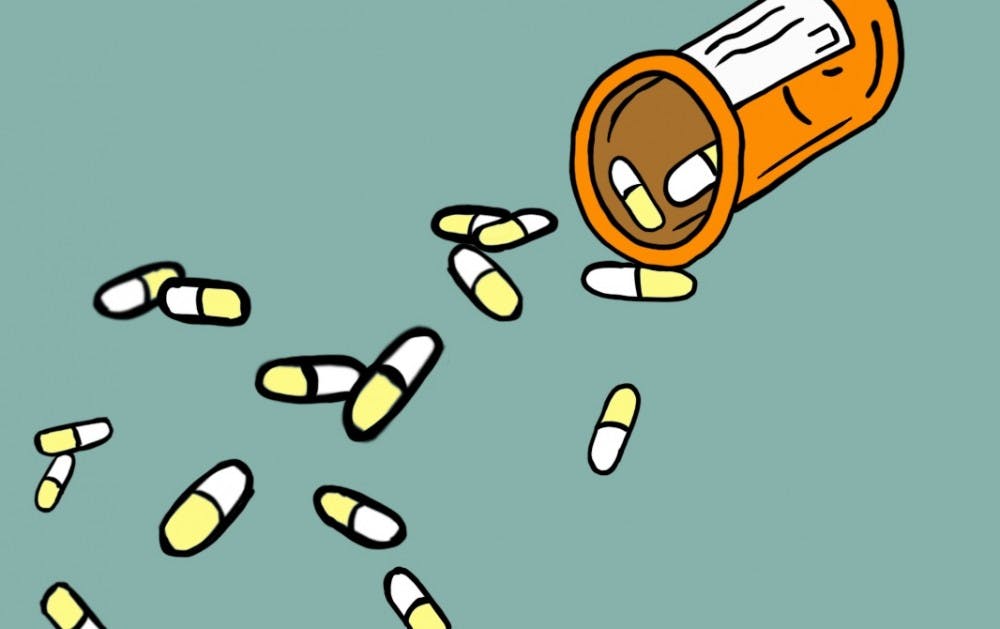It's a line straight out of an anti-drug PSA, a defense that more and more students might use as Adderall use increases across college campuses.
"I wouldn't say that I'm addicted to it," said a journalism sophomore. "I mean, I can function without it, but I definitely crave it. I'm more productive, focused and confident when I take it."
A 2016 study published in The Journal of Clinical Psychiatry found an increase in the non-medical use of dextroamphetamine-amphetamine, more commonly known by Adderall, and an increase in emergency room visits related to the drug, despite no increase in prescriptions. This indicates growing abuse of the drug, though the jury is out on its long-term effects.
According to the study, dextroamphetamine-amphetamine use on college campuses is especially common, and 60 percent of all nonmedical use occurred in 18 to 25-year-olds.
The questions following the study were: how is the drug spreading, who's distributing it and why do people want it?
"I started using halfway through my freshman year," said an ASU journalism sophomore. "I was working two jobs with a full course load. I couldn't get everything done alone anymore."
The 2016 National Survey on Drug Use and Health conducted by the Substance Abuse and Mental Health Services Administration found that about two-thirds of young adults get Adderall and other stimulants from their friends, roommates and family members with prescriptions. Full-time students abuse these drugs at twice the rate of peers who don't attend college, according to the survey.
While it is illegal for individuals with a prescription to sell drugs to others, that doesn't stop some from profiting off their prescription.
"I started selling in high school," said an ASU medical studies graduate who preferred not to be named. "I never used my prescription, so I figured I might as well make some money off of it. I sell to a few people constantly, and get additional buyers every once in a while."'
Arizona drug possession laws states that if an individual is in possession of 9 grams of Adderall, or other amphetamine, they face a mandatory prison sentence regardless of proof of sale. For context, 9 grams of Adderall is equivalent to 450 pills at 20 mg each.
Because Adderall is a stimulant, the effects are similar to those of cocaine, as it enhances focus and provides an energy boost for productivity.
Cases of Adderall abuse are part of an epidemic of prescription drug misuse in the U.S., though the recent focus has been on opioids, which killed 769 in Arizona in 2016.
Like prescription opioids, Adderall is known for its high potential for tolerance, which can lead to addiction, or the progression to other stronger substances.
"Medication prescriptions are designed to maximize effective dose and safety," said Aaron Krasnow, associate vice president of ASU Counseling Services. "Deviating from dose, frequency or taking medication not prescribed for you is inherently dangerous."
James Hodge, a professor of health law and ethics at the Sandra Day O'Connor College of Law, said greater surveillance of Adderall prescriptions and potential limitations on the amount prescribed could be effective in combatting the abuse of the substance, but that the public needs to be realistic about a few things, including the differences in the severity of opioid and Adderall abuse consequences.
"We would not use, from a public health perspective, more heavy-handed approaches for Adderall," Hodge said. "Let's not go so far as to apply opioid measures to other drugs. Students should become highly aware of how minor prescriptions can become life habits."
The side effects of Adderall withdrawals can be debilitating, which can make it difficult for people to quit using.
Sellers of the drug said they tend to notice a sense of dependency on Adderall from their buyers who generally request higher doses around finals and other exams.
"I usually sell to friends who want it for tests or all-nighters," said an ASU finance sophomore, "I think only a few, if any, are dependent on the medicine, but they could have easily gotten (some) from someone else too."
The sophomore typically sells 20 mg pills for $5 each, but said they knows some dealers that charge up to $10 per pill.
TreeHouse Learning Community is a support group available to students who are recovering from dependency and addiction. The goal of the organization is to connect students with each other while facilitating a healthy recovery environment.
"We don't need to talk to your parents or the school," said Molly McGinn, the co-founder of TreeHouse. "It's more just like 'come on in, you're far from alone, and let's try to make your life a little easier.'"
McGinn said that, without a doubt, the abuse of substances like Adderall and Vyvanse is higher on college campuses than within the general population.
McGinn said she created TreeHouse because she enjoys working with college students, and she used amphetamines in college as well.
"I really came to appreciate what amphetamines can do for you, and I'm in recovery now," McGinn said.
She said it would have been great to have something similar to TreeHouse when she was in college because she could have had conversations about her dependency with people she admired.
"If we're going to reduce the stigma, we need people who are successful to come forward and say 'that was me too,'" McGinn said.
Reach the reporter at adunn11@asu.edu or follow @adrienne_dunn on Twitter.
Like The State Press on Facebook and follow @statepress on Twitter.




